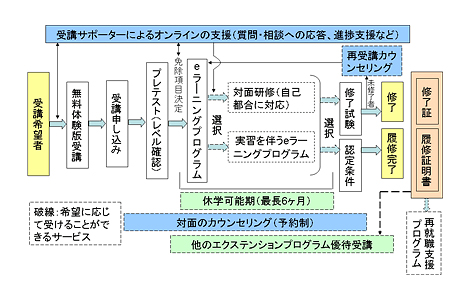- ホーム
- 研究・産官学連携
- 研究実績
- 各種事業採択プログラム
- 主婦・団塊世代等社会人経験を有する人材に対するオンライン学習支援者育成プログラム
主婦・団塊世代等社会人経験を有する人材に対するオンライン学習支援者育成プログラム
- MENU -
主婦・団塊世代等社会人経験を有する人材に対するオンライン学習支援者育成プログラム
※本取組は、2008年度から2010年度まで文部科学省の委託業務として、青山学院大学社会連携機構ヒューマン・イノベーション研究センター(HiRC)で展開され、その後も学内取組として事業を継続しています。
プログラム概要
本事業は、eラーニング等ICTを活用した遠隔教育において、オンラインコミュニケーションによって学習支援を担当するオンライン学習支援者(eメンタ)を育成する教育プログラムを開発・提供するものです。主な受講者として、企業をリタイヤした団塊世代および出産・育児等によって一時的に離職している主婦層を想定しています。
eメンタは、ネット環境があれば場所を問わずに働くことが可能で、ICT活用教育を成功に導くために必要とされる職種として社会的ニーズも高まっています。受講者は、学習支援の活動ガイドラインが提示されている状況のもとで具体的な活動のためのアクションプランを記述し、基本的なオンライン学習支援活動ができるようになることを目標とします。
プログラム実施報告
本事業は、社会人学び直しのための教育プログラムとして、受講者および社会のニーズに応える学び直しを支援することを目的としています。そこで、受講者の再就職に貢献する実践的スキルの習得を目指して、コンテンツ、研修、テストを開発しています。
具体的には、eラーニングによる基本知識の学習と、対面研修による実践スキルの習得を組み合わせて、受講者の利便性を図るとともに、実務に役立つ成果を保証します。受講の流れを紹介しますと、まず、簡単なスキルチェックテストを行い、受講者に求められる最低限のPCスキルレベルを確認します。合格者に対しては、使用するシステムやプログラム内容のオリエンテーションを実施します。その後、eラーニングと対面研修を交互に提供し、学習効果を高めます。また、成果を保証するために最終的な修了テストも実施します(図参照)。
本事業は、HiRCが主催する研修プログラムであり、社会人からみるとエクステンションプログラムに相当します。学部や大学院において実施している学習支援に関連した正規科目の内容、およびeメンタに対する本学の研究成果を反映して、社会的にも評価される高度な教育サービスを実現しました。したがって、他のエクステンションプログラムと比べ、手厚いサービスが提供されました。

プログラム成果
オンライン学習支援者(メンタ)はまだこれからの人材のために、現状では認知度がそれほど高くありません。そのため、特定非営利活動法人日本イーラーニングコンソシアム(略称eLC)のe ラーニング専門家資格の中でも学習支援に関連した「eLPチューター」資格に対して、相互認定を受けられるようにしました。また、本事業の実施・評価にあたっては、学外協力団体・企業・商工会議所等の協力を得ることができました。
講座は2年間で140人以上の修了者を輩出し(HiRCから修了証を授与)、そのうち約17%がeLPチューターを取得しました。また、修了者の約28%が、正規または非正規の職を得て、オンライン学習者として活躍していることから、社会人学び直し事業としての目標を達成することができました。日本では、オンラインの学習支援に関連した知識やスキルを体系的に習得した学習者はほとんど存在しなかったことから、本事業の果たした意義は非常に大いといえます。